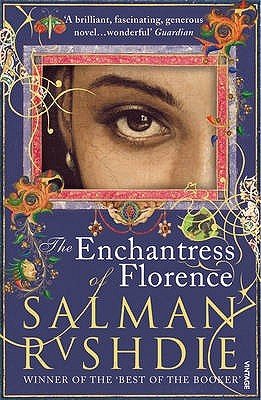The Enchantress of Florence

Rating: 3.8/5
Author: Salman Rushdie
Publisher: Random House
Publishing Date: April, 2008
Language: English
Genre: Fiction
ISBN-10: 0679640517
ISBN-13: 978-0679640516
Format: Paperback
Pages: 368
Cost: Rs. 599 (Paperback), Rs. 289.75 (Kindle Edition), Rs. 940 (Hardcover)
Plot:
The Enchantress of Florence is the story of a mysterious woman, a great beauty believed to possess the powers of enchantment and sorcery, attempting to command her own destiny in a man’s world. It is the story of two cities at the height of their powers–the hedonistic Mughal capital, in which the brilliant emperor Akbar the Great wrestles daily with questions of belief, desire, and the treachery of his sons, and the equally sensual city of Florence during the High Renaissance, where Niccolò Machiavelli takes a starring role as he learns, the hard way, about the true brutality of power.
Review:
The Book is divided in three parts-
Part One: tells the tale of adventure begins in Fatehpur Sikri, the capital of Mughal emperor Akbar the Great, when a stranger arrives, having stowed away on a pirate ship captained by the Scottish Lord Hauksbank, and sets the Mughal court talking and looking back into its past.
Part Two: The stranger begins to tell Akbar the tale, going back to the boyhood of three friends in Florence, Il Machia, Ago Vespucci and Nino Argalia, the last of whom became an adventurer in the East.
Part Three: The tale returns to the mobs and clamour of Florence in the hands of the Medici dynasty.
The book relates a succession of interweaving stories by a variety of storytellers, travellers and adventurers and of course touches on the histories and cultures of the various settings including the Mughal and Ottoman Empires, the earlier Mongols, and Renaissance Florence.
There is a strong theme of sex and eroticism, much of it surrounding the Enchantress, who was inspired by the Renaissance poem Orlando Furioso. There is also a recurring discussion of humanism and debate as opposed to authoritarianism, and Machiavelli is a character in the book. Like Rushdie's previous works, the book can be considered a work of magic realism.
But there is another theme to the book: ‘Religion’: Akbar in his splendid city, and the Florentines in theirs, inhabited a world of magic as passionately as they inhabited the world of tactile matters.
One may constantly question about the heavy details and if they are realistic or just a fragment of Rushdie’s imagination. Interestingly, Rushdie spent years researching this work and in his interviews, he claims that much of what one might think the most fantastical - the Shi'a monarch who uses his enemy's skull as a drinking goblet or the Ottoman Caliph who's gardeners double as his executioners - are in fact the ones that are indeed true.
About the Author:
Of Indian origin, Sir Ahmad Salman Rushdie born on 18 June, 1947 is one of the best living writers in English. Combining historical fiction with magical realism, Rushdie has been courting controversy ever since Midnight's Children was published in 1981. The novel went onto win the Booker Prize. He is the author of six novels - Grimus, Midnight's Children, which won the Booker Prize in 1981 and the James Tait Black Prize; Shame- winner of the French Prix du Meilleur Livre Etranger; The Satanic Verses which won the Whitbread Prize for Best Novel; Haroun and the Sea of Stories which won the Writer's Guild Award and The Moor's Last Sigh which won the Whitbread Novel of the Year Award. He has also published a collection of short stories East, West, a book of reportage The Jaguar Smile, a volume of essays ‘Imaginary Homelands’ and a work of film criticism ‘The Wizard of Oz’.
Salman Rushdie was awarded Germany's Author of the Year Award for his novel The Satanic Verses in 1989. In 1993, Midnight's Children was voted the 'Booker of Bookers', the best novel to have won the Booker Prize in its first 25 years. In the same year, he was awarded the Austrian State Prize for European Literature. He is also Honorary Professor in the Humanities at the Massachusetts Institute of Technology and a Fellow of the Royal Society of Literature. His books have been published in more than two dozen languages.















































